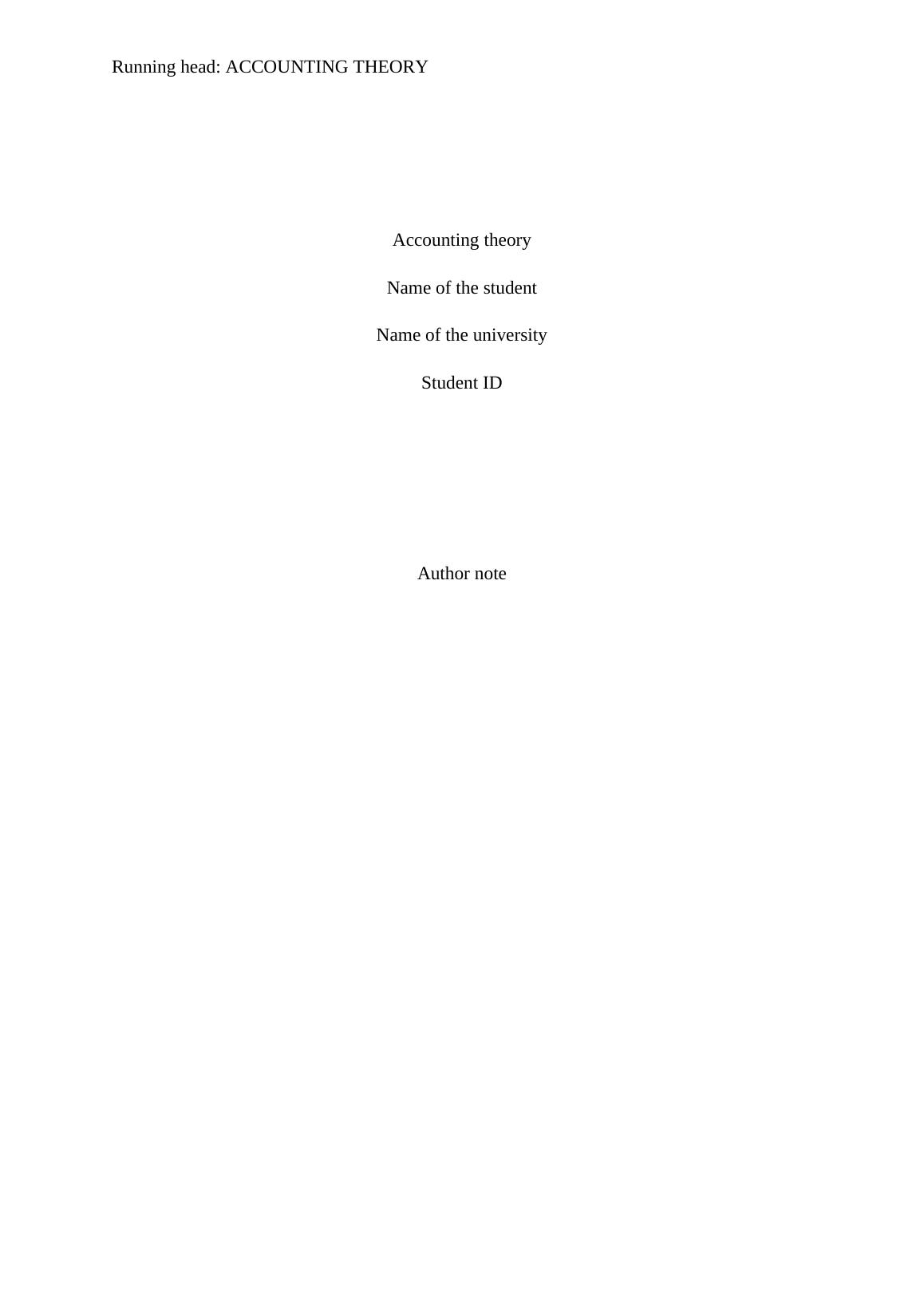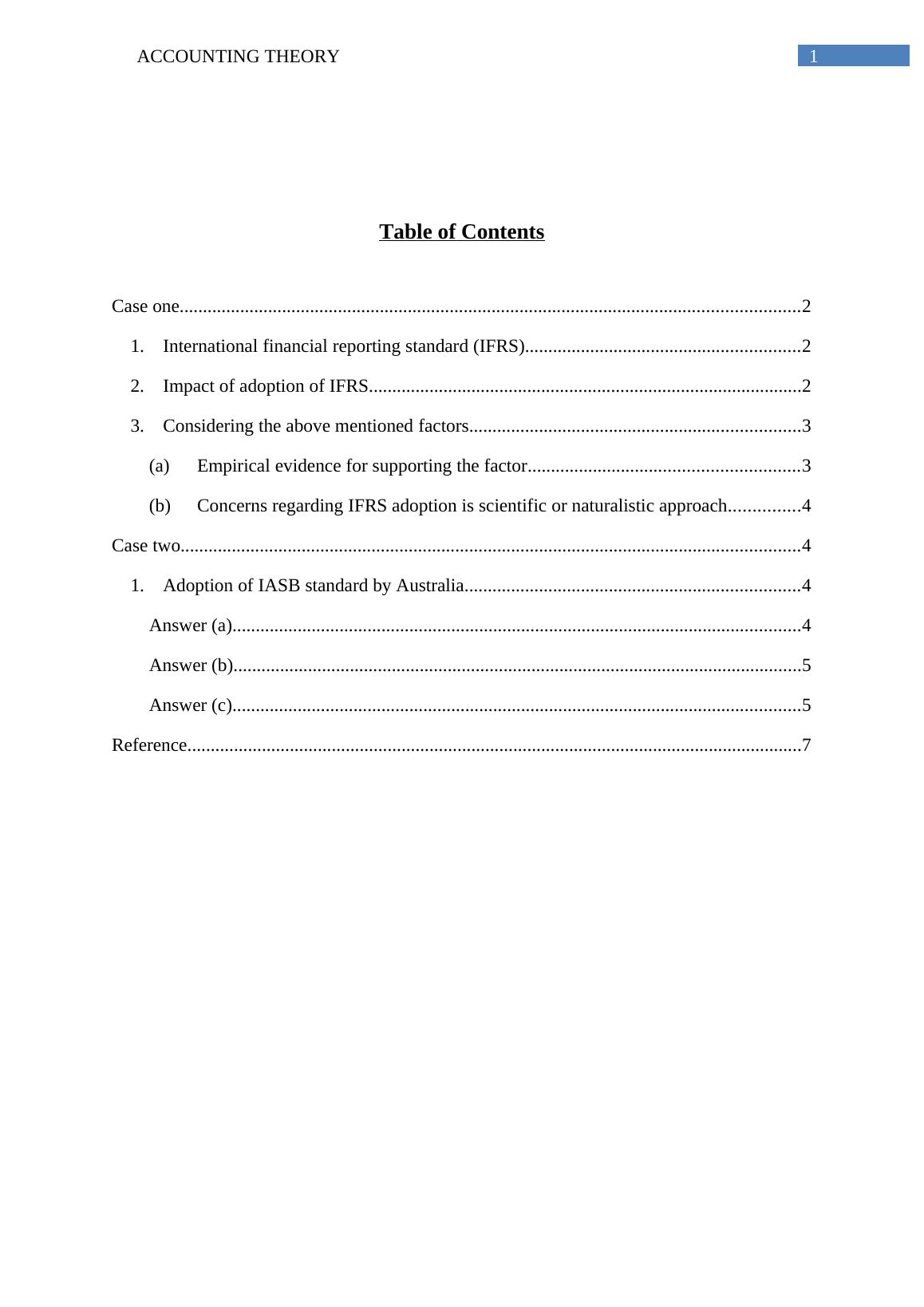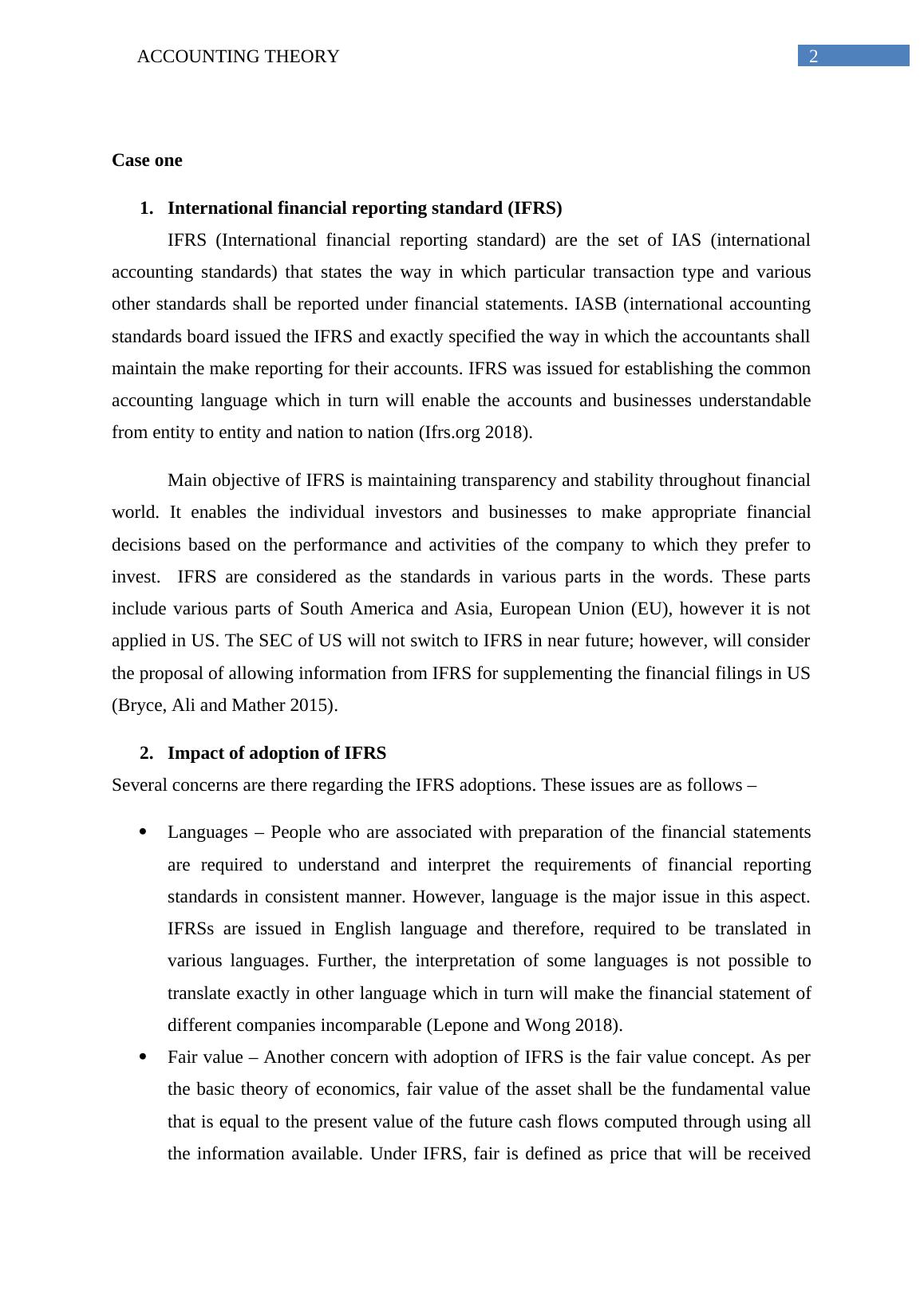Accounting Theory: IFRS Adoption and Impact on Financial Reporting
Added on 2023-06-03
9 Pages2172 Words266 Views
Running head: ACCOUNTING THEORY
Accounting theory
Name of the student
Name of the university
Student ID
Author note
Accounting theory
Name of the student
Name of the university
Student ID
Author note

1ACCOUNTING THEORY
Table of Contents
Case one.....................................................................................................................................2
1. International financial reporting standard (IFRS)...........................................................2
2. Impact of adoption of IFRS.............................................................................................2
3. Considering the above mentioned factors.......................................................................3
(a) Empirical evidence for supporting the factor..........................................................3
(b) Concerns regarding IFRS adoption is scientific or naturalistic approach...............4
Case two.....................................................................................................................................4
1. Adoption of IASB standard by Australia........................................................................4
Answer (a)..........................................................................................................................4
Answer (b)..........................................................................................................................5
Answer (c)..........................................................................................................................5
Reference....................................................................................................................................7
Table of Contents
Case one.....................................................................................................................................2
1. International financial reporting standard (IFRS)...........................................................2
2. Impact of adoption of IFRS.............................................................................................2
3. Considering the above mentioned factors.......................................................................3
(a) Empirical evidence for supporting the factor..........................................................3
(b) Concerns regarding IFRS adoption is scientific or naturalistic approach...............4
Case two.....................................................................................................................................4
1. Adoption of IASB standard by Australia........................................................................4
Answer (a)..........................................................................................................................4
Answer (b)..........................................................................................................................5
Answer (c)..........................................................................................................................5
Reference....................................................................................................................................7

2ACCOUNTING THEORY
Case one
1. International financial reporting standard (IFRS)
IFRS (International financial reporting standard) are the set of IAS (international
accounting standards) that states the way in which particular transaction type and various
other standards shall be reported under financial statements. IASB (international accounting
standards board issued the IFRS and exactly specified the way in which the accountants shall
maintain the make reporting for their accounts. IFRS was issued for establishing the common
accounting language which in turn will enable the accounts and businesses understandable
from entity to entity and nation to nation (Ifrs.org 2018).
Main objective of IFRS is maintaining transparency and stability throughout financial
world. It enables the individual investors and businesses to make appropriate financial
decisions based on the performance and activities of the company to which they prefer to
invest. IFRS are considered as the standards in various parts in the words. These parts
include various parts of South America and Asia, European Union (EU), however it is not
applied in US. The SEC of US will not switch to IFRS in near future; however, will consider
the proposal of allowing information from IFRS for supplementing the financial filings in US
(Bryce, Ali and Mather 2015).
2. Impact of adoption of IFRS
Several concerns are there regarding the IFRS adoptions. These issues are as follows –
Languages – People who are associated with preparation of the financial statements
are required to understand and interpret the requirements of financial reporting
standards in consistent manner. However, language is the major issue in this aspect.
IFRSs are issued in English language and therefore, required to be translated in
various languages. Further, the interpretation of some languages is not possible to
translate exactly in other language which in turn will make the financial statement of
different companies incomparable (Lepone and Wong 2018).
Fair value – Another concern with adoption of IFRS is the fair value concept. As per
the basic theory of economics, fair value of the asset shall be the fundamental value
that is equal to the present value of the future cash flows computed through using all
the information available. Under IFRS, fair is defined as price that will be received
Case one
1. International financial reporting standard (IFRS)
IFRS (International financial reporting standard) are the set of IAS (international
accounting standards) that states the way in which particular transaction type and various
other standards shall be reported under financial statements. IASB (international accounting
standards board issued the IFRS and exactly specified the way in which the accountants shall
maintain the make reporting for their accounts. IFRS was issued for establishing the common
accounting language which in turn will enable the accounts and businesses understandable
from entity to entity and nation to nation (Ifrs.org 2018).
Main objective of IFRS is maintaining transparency and stability throughout financial
world. It enables the individual investors and businesses to make appropriate financial
decisions based on the performance and activities of the company to which they prefer to
invest. IFRS are considered as the standards in various parts in the words. These parts
include various parts of South America and Asia, European Union (EU), however it is not
applied in US. The SEC of US will not switch to IFRS in near future; however, will consider
the proposal of allowing information from IFRS for supplementing the financial filings in US
(Bryce, Ali and Mather 2015).
2. Impact of adoption of IFRS
Several concerns are there regarding the IFRS adoptions. These issues are as follows –
Languages – People who are associated with preparation of the financial statements
are required to understand and interpret the requirements of financial reporting
standards in consistent manner. However, language is the major issue in this aspect.
IFRSs are issued in English language and therefore, required to be translated in
various languages. Further, the interpretation of some languages is not possible to
translate exactly in other language which in turn will make the financial statement of
different companies incomparable (Lepone and Wong 2018).
Fair value – Another concern with adoption of IFRS is the fair value concept. As per
the basic theory of economics, fair value of the asset shall be the fundamental value
that is equal to the present value of the future cash flows computed through using all
the information available. Under IFRS, fair is defined as price that will be received

End of preview
Want to access all the pages? Upload your documents or become a member.
Related Documents
Adoption of IFRS and its Concerns: A Case Studylg...
|9
|2218
|101
Accounting in Context (Macquarie)lg...
|6
|886
|366
Importance of IFRS in Global Financial Reportinglg...
|4
|741
|359
International Financial Reporting Standards and their Concernslg...
|10
|2379
|342
Advance Financial Accounting: Reportlg...
|18
|4129
|43
Contemporary Accounting Theorylg...
|7
|1673
|53